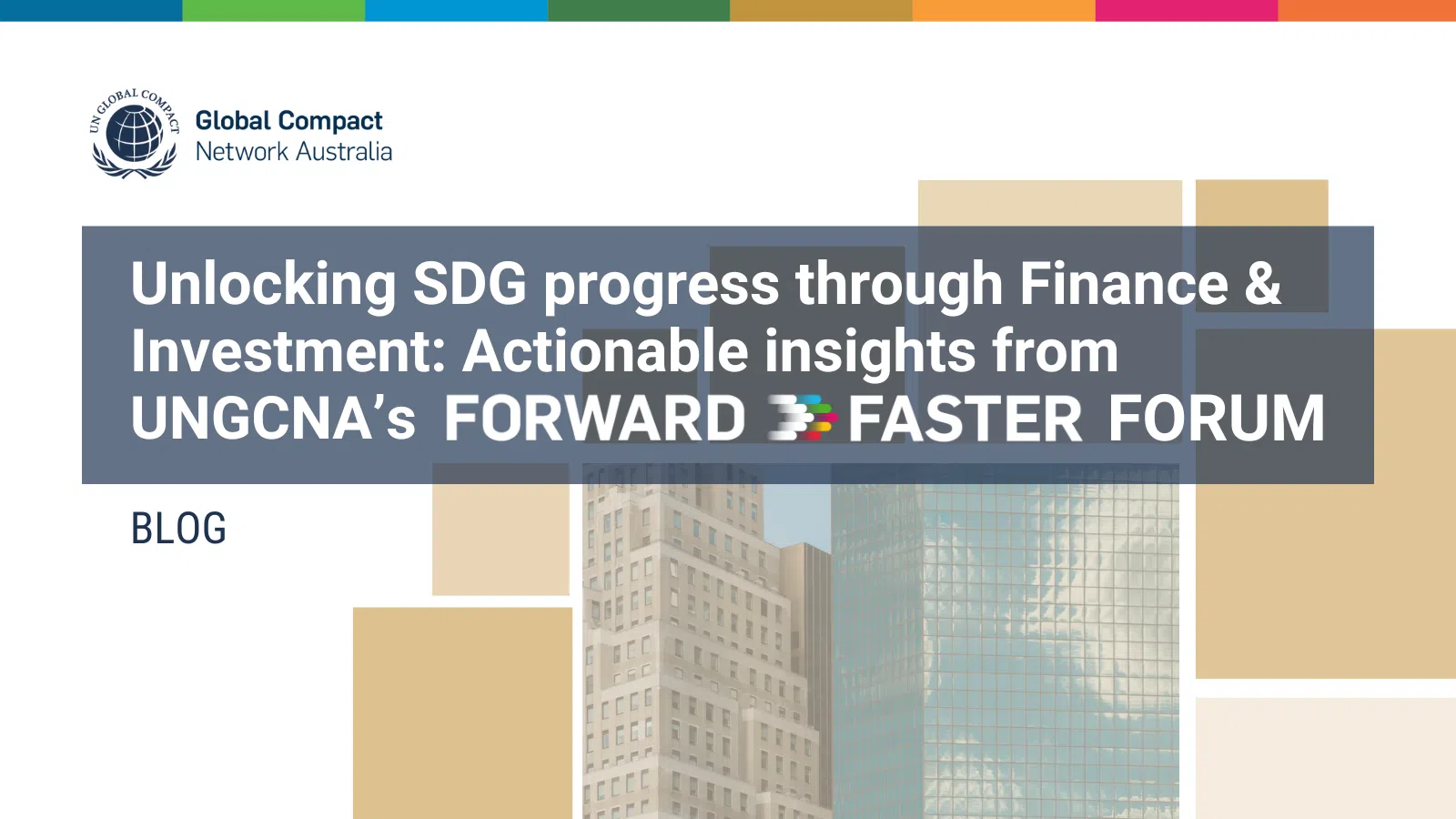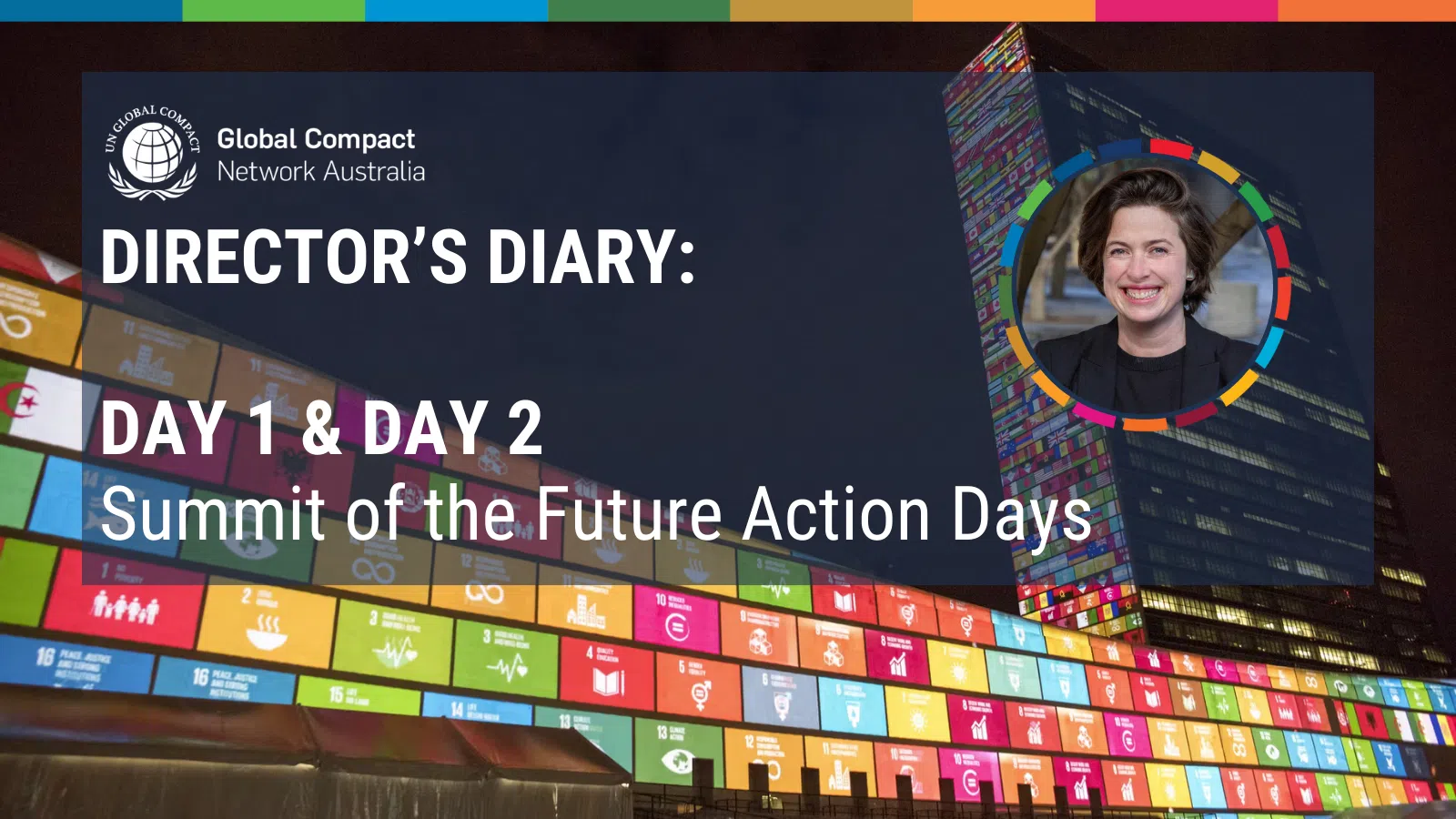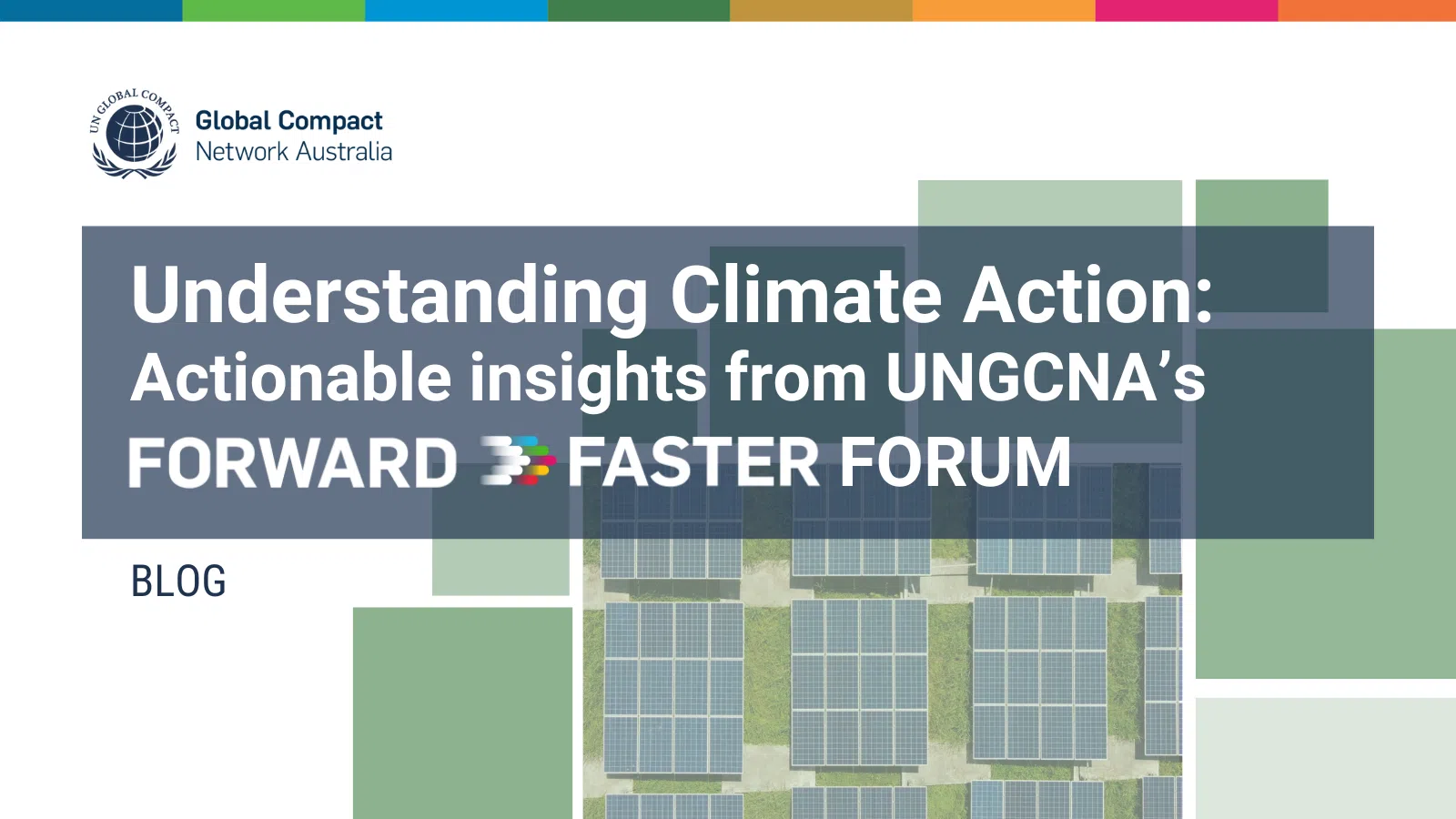
Blogs, Sustainable Development Goals
BLOG | Unlocking SDG progress through finance and investment: Actionable insights from UNGCNA’s Forward Faster Forum
UN Global Compact Network Australia | June 26, 2024
According to United Nations estimates, an annual incremental investment of approximately $3-5 trillion globally is required to achieve the UN Sustainable Development Goals (SDGs) by 2030.
Supporting the challenges faced in sustainable finance, the UN Global Compact’s Forward Faster initiative aims to accelerate progress towards the SDGs by encouraging the private sector to take measurable, credible, and ambitious actions across five key areas: Gender Equality, Climate Action, Living Wage, Finance & Investment, and Water Resilience.
As part of the global Forward Faster initiative, the UN Global Compact Network Australia (UNGCNA) recently held its inaugural Forward Faster Forum in Melbourne, bringing together business leaders and change-makers.
Here are some of the benefits of taking action, and the top three takeaways from the finance and investment panel discussion with.
UNGCNA’s Forward Faster Forum – Finance & Investment panel:
- Fiona Reynolds (Facilitator), Chair, UN Global Compact Network Australia
- Alison Chan, Investment Director, Sustainable Finance, Metrics Credit Partners
- Jacqueline Fox, Chief Climate Officer, National Australia Bank
- Dr Arjuna Dibley, Head of Sustainable Finance Hub, University of Melbourne
How will taking ambitious action in sustainable finance benefit your company?
Aligning financing and investment strategies with the SDGs unlocks new revenue possibilities. Some of the benefits of setting targets for finance and investment strategies include:
- Attracting investors and opening up new avenues for capital investment
- Protecting long-term financial performance and avoiding potential legal and reputational issues
- Identifying and mitigating risks associated with environmental, social, and governance (ESG) factors
- Attracting top talent who prioritise purpose-driven work and seek employers committed to sustainability
- Expanding into new markets and attracting environmentally and socially conscious customers.
Key takeaways
Here are three key takeaways from the session.
- A globally volatile economic and political environment may affect sustainable financing; however, the private sector must remain steadfast on its commitment to sustainability.
Lending an academic lens, Dr. Arjuna Dibley noted that the “macro-economic and geo-political environment play a significant role in the fluidity of sustainable financing,” emphasising the imperative of “equitable global distribution of these finances” across nations.
Alison Chan further highlighted that even amidst such volatility more governments, including the Australian government, are pushing for mandatory climate reporting for companies, influencing investments in sustainable practicing.
A leading example of the private sector’s robust commitment towards sustainable financing is National Australia Bank’s (NAB) multi-pronged approach outlined by Jacqueline Fox: “NAB’s approach involves crucial undertakings like a decarbonisation drive aimed at aiding clients in curbing carbon emissions, ambitious environmental financing ventures, including $2.6 billion in green lending, and the issuance of green bonds worth $1.6 billion specifically designed for SDGs and climate solutions”.
- Governments must continue ensuring corporate accountability in ESG; but public-private collaboration will ensure progression in sustainable financing.
Fiona Reynolds initiated the discussion by citing the governments’ regulatory role, mentioning a recent case where ASIC won its first contested greenwashing action for civil penalties against Vanguard Investments Australia, illuminating the government’s role in “ensuring that [businesses] are doing what they said they were doing.”
Building on this, Alison Chan emphasized the private sector’s need to be clear, confident and candid about their approach, while advocating that businesses “seek opportunities to invest in early-stage ventures.” However, she acknowledged fiduciary challenges may require public sector support.
- Driving Sustainable Financing demand hinges on shifting mindsets.
Towards the conclusion of the panel, Fiona Reynolds asked the speakers – “What can we do to attract further demand for sustainable financing?”
Jaqueline Fox was optimistic about increased sustainable financing efforts by the private sector, but also endorsed an “overarching systemic change with tax incentives” to attract demand for green businesses.
Dr. Arjuna Dibley reminded the audience of the need for a global collaborative outlook between private and public actors for “shared progress and larger impact”.
Recounting her investment fund management experience, Alison Chan reported positive investor interest in aligning with sustainability goals. She instilled hope, stating: “If we get their hearts and minds, their chequebooks aren’t far behind,” signifying conviction can drive tangible change.
The UN Global Compact’s Forward Faster initiative
The UN Global Compact’s Forward Faster initiative was launched on 18 September 2023 and focuses on five areas of action where companies can make the biggest, fastest impact across the 17 SDGs by 2030. The five areas of action are:
- Gender equality
- Climate action
- Living wage
- Finance and investment
- Water resilience.
The Forward Faster initiative’s finance and investment targets are:
Target 1 – Align corporate investment – to the fullest extent possible – with SDG policies and strategies, and set targets, track and report on the amount and proportion of such SDG investments.
Target 2 – Establish a corporate financing strategy that is linked to SDG investments and performance, and report on the amount and proportion of such SDG finance.
Join the companies taking action – Turning pledges into action
With an immense task at hand, smart policies, robust transparency, consumer mobilisation and symbiotic partnerships can bridge the annual $3-5 trillion sustainable investment gap towards achieving the SDGs.
The Forward Faster initiative is supporting companies to take ambitious, measurable, and credible action towards achieving SDGs by providing a framework to guide all businesses regardless of size, complexity or location.
The journey towards achieving the SDGs requires unprecedented cooperation across sectors and borders. Currently, only 15% of the SDGs are on track to be realised by 2030.
To join the companies taking action or to find out more about the UN Global Compact’s Forward Faster initiative go to: forwardfaster.unglobalcompact.org
Contributors:
Ananya Kajla, Sustainability Governance Intern, UN Global Compact Network Australia.
Julia Bourke, Senior Coordinator, UN Global Compact Network Australia.


